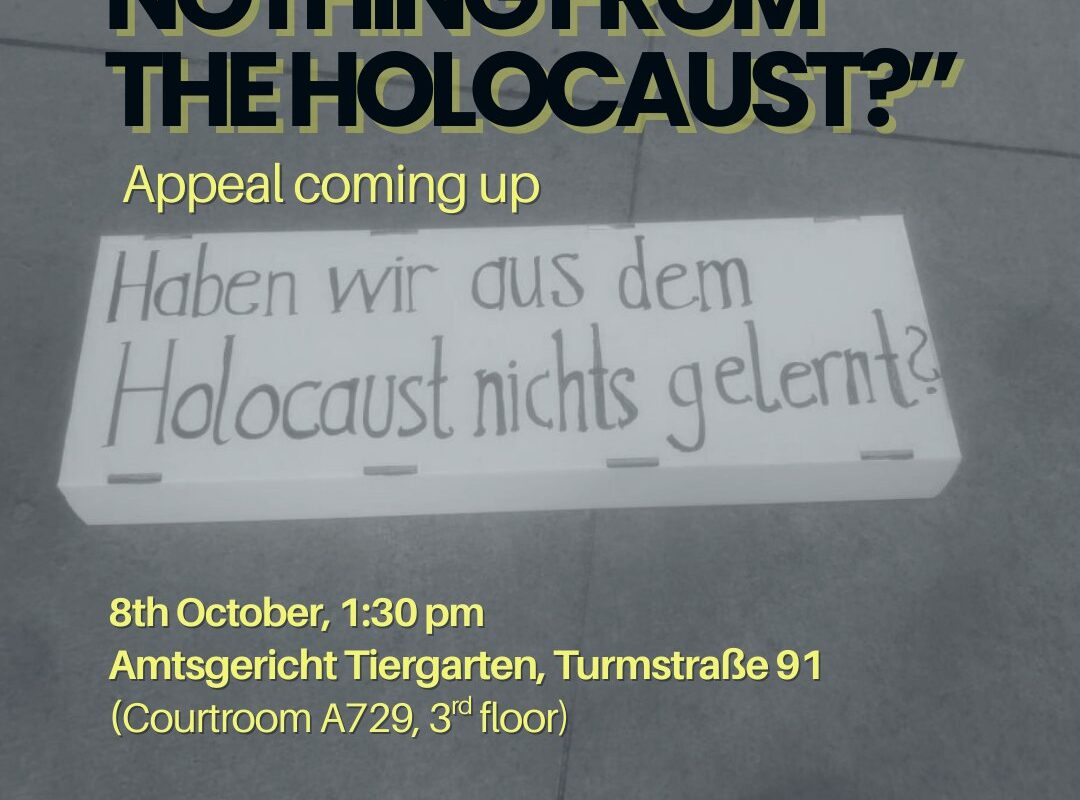Martina Winkler (name changed for anonymity) was convicted for carrying a sign which read “Have we learned nothing from the Holocaust?” at a protest against the Gaza genocide in Berlin’s government district.
In June you were sentenced to pay a €1,500 fine because you walked around the governmental district holding a sign on which you’d written “Have we learned nothing from the Holocaust?”. What do you expect the appeal process to look like?
The verdict is unjust. I knew from the beginning that I would take action against it. For me, it’s less about obtaining a desired outcome, and more about setting a precedent. I don’t consider myself to be guilty and would like that confirmed for myself and for others.
What does your lawyer have to say about the decision?
From the beginning she was convinced that the verdict would have to be in my favour, and other lawyers I spoke to thought the same.
What makes you think that the outcome could be different this time?
Particularly in cases related to Palestine, different judges have made very different decisions. To me, this means that it’s important to repeat the process with another judge.
Were you surprised at the time that charges could even be brought against you?
I definitely didn’t expect it—I was convinced that I was protected by freedom of expression and freedom of speech. I never thought that what I was doing could be even remotely criminal.
Do you get the impression that more people from the international community are active in the Palestine Solidarity Movement here?
Yes, I also get the impression that there are more people with Arab origins.
Could the proceedings be influenced by the international recognition of the situation in Gaza as a genocide by the UN Human Rights Commission?
At this point, many people living here understand that it’s a genocide, because it’s been confirmed by international authorities. But many feel that it isn’t their responsibility, and put it on a level with other wars, for example the one Ukraine.
Do you think this can be explained by the fact that the government, and businesses with headquarters in Germany, are both responsible for the damage Israeli soldiers are wreaking in Gaza?
Definitely. People who criticise Israel’s military actions in Palestine or simply express their solidarity with Palestinians face severe repression or lose their jobs—because of this, many are wary. And then there’s the role of the media, which spreads certain narratives, shaping public opinion.
For those who aren’t aware of your case, what motivated you to make the signs and carry them with you?
I moved to Berlin about a year and a half ago—so now I live in a city that is also the seat of government. I work in the social sector and have grown fond of the city. My motivation for carrying the signs came from following coverage of Israel’s military action in Gaza every day since October 7, 2023. Then, in no time at all, so many people were killed by the Israeli army, even hospitals were attacked, and I couldn’t bear it. The world had watched this all live. It was traumatising. I was distraught and overwhelmed and it was clear to me that I couldn’t sit at home and do nothing. All that remained was for me to go out into the streets, hold up the signs and confront the public with them.
My grandparents witnessed the Holocaust. The most important lesson for me is that we, as Germans, must never allow crimes against humanity to happen again—against anyone. It’s important to me that no one thinks that I’m relativising the Holocaust. It’s the opposite: I’m asking myself what lessons we can learn from it. It’s dangerous for Germans to think that this issue doesn’t concern them. We certainly bear that responsibility.
This interview originally appeared in German in junge Welt. Translation: Ciara Bowen. Reproduced with permission. You can order a free trial subscription to junge Welt here.





